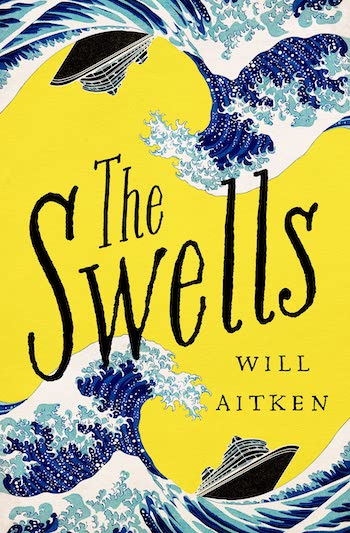Book Review: “The Swells” — Expertly Cruising Through Satiric Waters
By Gerald Peary
Is it possible that adventurous readers have a better feel for the virtues of this zany, demanding satire than fuddy-duddy critics?

A little birdie up north told me a curious tale, that a new novel, The Swells, by my Montreal pal Will Aitken, is flying high on sales though, so far, every single review of Aitken’s satiric book has been bad — very bad. Is it possible that adventurous readers have a better feel for the virtues of this zany, demanding satire than fuddy-duddy critics? That’s my conclusion after a satisfying perusal of Aitken’s latest. It’s an estimable entry in his varied literary career, which includes first-rate journalism and film criticism, three fine earlier novels — one of them, A Visit Home, about his traumatized childhood in Indiana — also a brilliant queer-eye book-length essay on Luchino Visconti’s film version of Death in Venice and a vivid behind-the-scenes on an innovative European stage adaptation of Sophocles’s Antigone.
Virtually all of Aitken’s work leans on personal experience. The Swells harkens back to its author’s semi-sketchy past as a tony travel journalist, which means seeing the world on other people’s deep pockets and (the unstated pact) agreeing to write benignly and enthusiastically about sponsored trips. Yes, it’s oodles of fun and awesome perks being on the travel writer circuit. I’ve done it myself on several occasions, with whorish paid-for trips to Jamaica, Martinique, and even Japan. But The Swells asks, how does this go down if you wish also to be a person of conscience? I read Aitken’s novel with an eye to whether his female protagonist, someone politically unformed, would become “woke” to the price she pays as a booster and spokesperson for the ruling monetary class. Could there be a crisis situation where she would be pushed to change her loyalties? Provoked to answer the eternal question: which side are you on?
Briony is a Canadian travel writer residing in New York City. She’s on staff of the chic magazine, Euphoria!, where she’s privy to an opulent life. As we meet her on page one, our heroine is feasting on “lettuce gazpacho with brown crab and whey granita starter” at “a new seven-star underwater restaurant with sheer glass walls.” Lovely! But she gets her comeuppance when Euphoria! is bought out by Chinese casino titans. In an instant, Briony is bumped to freelancer work for Jaunt!, an upstart online publication. Aitken: “This is how Briony’s life of sumptuous new homelessness begins. She will now travel from gig to luxury travel gig with only the designer togs in her luggage, paying nothing, earning less, and never ever settling down.”
But why bitch when Asia awaits? A PR flack makes room for Briony aboard the fabulous luxury liner Emerald Tranquility. This Japanese-owned Ship of Fools is a floating, multilevel Disney World for those aged and infirm who also are extremely rich. The habitués this time around include various and sundry minor royalty; Yale’s ever-popular Whippenpoofers performing their never-gets-old Cole Porter ditties; a rotund faux Little Buddha with nonspiritual appetites; an Eastern European retired movie star who appeared in R.W. Fassbinder’s The Scalding Despair of Rota Gravure (sic); and, last and least, the faded gossipy film critic Rex Reed, brought on ship to lecture the geriatrics about celebs he’s known.
But out of the corner of her eye, Briony beholds a nonutopian world of misery and of the downtrodden. Even before the ship embarks from New York, she is witness to the beating of a street boy, something pooh-poohed by the Emerald Tranquility’s PR lady, Mimi. Sailing away, Briony becomes cognizant that, way below deck, there is hellish suffering among the miserably paid staff who live there on bunk-beds; and the farther you descend, the blacker the color of the skin. For now, Briony stays a neutral force, even as, in mounting Buñuelian surrealist strokes, the ship is attacked by bearded pirates, and then the boat’s crew revolts for a full-fledged mutiny. It’s led by a white-haired white lady savior, who spouts Marxist rhetoric and acts like a modern Robespierre. Under her watch, it’s the wealthy old coots who are made to swab the decks in the hot sun, and many keel over dead in the process.

Will Aitken, author of The Swells. Photo: courtesy of House of Anansi
There’s more that’s deeply troubling. A day trip of passengers to a colonialist island to watch the tranquil, happy natives making silk ends quite badly with an earthquake, and with hundreds of dead among the silk sweatshop workers. The consolation is that there are no injuries among the visiting tourists, only the trauma — poor rich folk! — of having to see all those fallen bodies. Can something be done to lift up this island? Here’s the cynical, heartless reply of an astute visitor: “The way of the world. Bring in new laws, new regulations, higher pay for workers, better safety inspections, tighter codes.… Western owners will simply close shop and relocate to a more open-market country.” How true!
I do have several reservations about The Swells. I wish we knew more about Briony’s wishes, aspirations, goals along the way, and it kind of gets lost that she’s a journalist and supposedly on assignment on this trip. And the lovely use of language, of unusual, mellifluent words in the first part of the book — “mauve striations,” “hectares of ormolu,” “she stares at her mucilaginous chin” — are mostly dropped later on. And, yes, the clever satire page after page does occasionally get bogged down a bit. And what happened to old Rex Reed, who disappears from the narrative?
Still, what a fascinating, skillfully written book! My dear friend Will Aitken does well by his admitted literary antecedents, as E.M. Forster would approve of his informed critiquing of colonialism and also the queer sexual passages; and Evelyn Waugh would find agreeable the desolate ending section of The Swells, recalling the eerie, isolated conclusion of A Handful of Dust.
Gerald Peary is a Professor Emeritus at Suffolk University, Boston, ex-curator of the Boston University Cinematheque, and the general editor of the “Conversations with Filmmakers” series from the University Press of Mississippi. A critic for the late Boston Phoenix, he is the author of nine books on cinema, writer-director of the documentaries For the Love of Movies: the Story of American Film Criticism and Archie’s Betty, and a featured actor in the 2013 independent narrative Computer Chess. His latest feature documentary, The Rabbi Goes West, co-directed by Amy Geller, has played at film festivals around the world.
